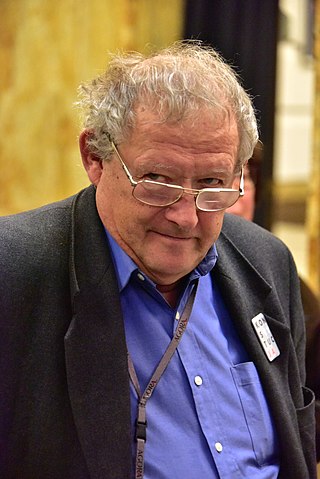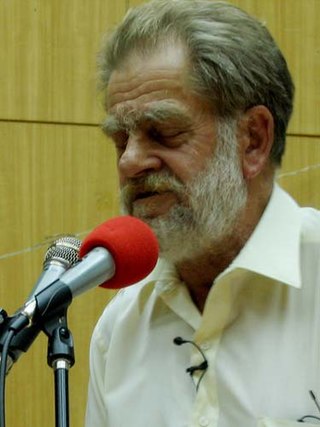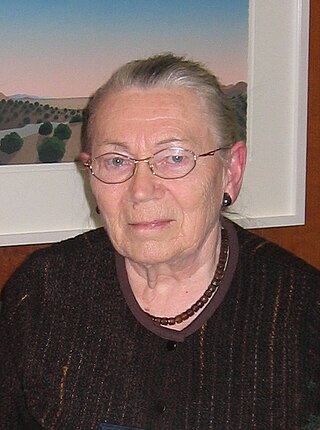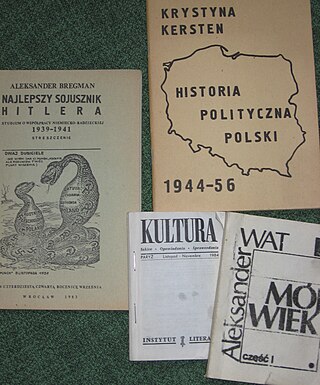Related Research Articles

Adam Michnik is a Polish historian, essayist, former dissident, public intellectual, as well as co-founder and editor-in-chief of the Polish newspaper, Gazeta Wyborcza.

Andrzej Gwiazda is an engineer and prominent opposition leader, who participated in Polish March 1968 Events and December 1970 Events; one of the founders of Free Trade Unions, Member of the Presiding Committee of the Strike at Lenin Shipyard in Gdańsk in August 1980, Vice President of the Founding Committee of Solidarity, then Vice President of Solidarity in 1980 and 1981; in December 1981 interned and next imprisoned with six other Solidarność leaders. His wife, Joanna Duda-Gwiazda also was a prominent member of the anticommunist opposition in the 1970s and 1980s.

Gazeta Wyborcza is a Polish nationwide daily newspaper based in Warsaw, Poland. It was launched on 8 May 1989 on the basis of the Polish Round Table Agreement and as a press organ of the trade union "Solidarity" in the election campaign before the Contract Sejm. Initially created to cover Poland's first partially free parliamentary elections, it rapidly grew into a major publication, reaching a circulation of over 500,000 copies at its peak in the 1990s.

The kotwica was an emblem of the Polish Underground State and Armia Krajowa used during World War II. It was created in 1942 by members of the Wawer minor sabotage unit within the AK, as an easily usable emblem for the struggle to regain the country's independence. The initial meaning of the initialism PW was pomścimy Wawer, in reference to the 1939 Wawer massacre, which was considered to be one of the first large scale massacres of Polish civilians by German troops in occupied Poland.

Biuletyn Informacyjny was a Polish underground weekly published covertly in General Government territory of occupied Poland during World War II. The magazine was edited by Aleksander Kamiński and distributed as the main organ of ZWZ-AK headquarters in Warsaw, initially in order to inform the AK soldier about ongoing resistance activities. By 1944 Biuletyn Informacyjny had a circulation of 42,000-43,000 copies. The publishers recommended readers to have the articles reprinted in provincial underground publications throughout Poland.

Bogusław Andrzej Sonik is a Polish politician and Member of the European Parliament for the Lesser Poland Voivodeship and Swietokrzyskie Voivodeship with the Civic Platform, part of the European People's Party and sits on the European Parliament's Committee on the Environment, Public Health and Food Safety.

Anna Walentynowicz was a Polish free trade union activist and co-founder of Solidarity, the first non-communist trade union in the Eastern Bloc. Her firing from her job at the Lenin Shipyard in Gdańsk in August 1980 was the event that ignited the strike at the shipyard, set off a wave of strikes across Poland, and quickly paralyzed the Baltic coast. The Interfactory Strike Committee (MKS) based in the Gdańsk shipyard eventually transformed itself into Solidarity; by September, more than one million workers were on strike in support of the 21 demands of MKS, making it the largest strike ever.

Solidarity, a Polish non-governmental trade union, was founded on August 14, 1980, at the Lenin Shipyards by Lech Wałęsa and others. In the early 1980s, it became the first independent labor union in a Soviet-bloc country. Solidarity gave rise to a broad, non-violent, anti-Communist social movement that, at its height, claimed some 9.4 million members. It is considered to have contributed greatly to the Fall of Communism.

Fighting Solidarity is a Polish anti-Soviet and anti-communist organization. It was founded in June 1982 by Kornel Morawiecki in the Polish city of Wrocław. Its creation was in response to the de-legalization of the Solidarity movement and associated communist government repression of the opposition symbolized by the imposition of martial law in 1981. Many consider this faction as one of the most radical and uncompromising splinters of the wider Solidarity movement.

Polish underground press, devoted to prohibited materials, has a long history of combatting censorship of oppressive regimes in Poland. It existed throughout the 19th and 20th centuries, including under foreign occupation of the country, as well as during the totalitarian rule of the pro-Soviet government. Throughout the Eastern Bloc, bibuła published until the collapse of communism was known also as samizdat.

Andrzej Bohdan Celiński is a Polish politician. Until 1989 activist of the democratic opposition in Poland. Former Member of Senate and Sejm. Minister of Culture in the government of Prime Minister Leszek Miller (2001-2002).
Klub Inteligencji Katolickiej is a Polish organization grouping Catholic intellectuals. KIK is organized into a series of local chapters (clubs).

Jarosław Władysław Guzy is a Polish politician and businessman, first chairman of the Independent Students Union, between 2023 and 2024 serving as Ambassador to Ukraine.

Kornel Andrzej Morawiecki was a Polish politician, the founder and leader of Fighting Solidarity, one of the splinters of the Solidarity movement in Poland during the 1980s. His academic background was that of a theoretical physicist. He was also a member of the 8th legislature of the Sejm, of which was also the Senior Marshal on 12 November 2015. His son Mateusz Morawiecki was the Prime Minister of Poland from 2017 to 2023, as well as a former chairman of Bank Zachodni WBK.

Jacek Jan Fedorowicz is a Polish satirist, caricaturist, underground comix artist and actor.

Edward Ryszard Müller is a Polish politician, a trade union activist; he was an oppositionist in the People's Republic of Poland and from 1989 to 1993 a deputy of the Contract Sejm and the First Term Sejm.

Teresa Klimek (1929-2013) was a Polish educator and activist. Educated to teach mathematics, she taught in various schools in Gorzów Wielkopolski from 1953 to 1984 and was honored for her skill as an educator. She helped found the Gorzów Wielkopolski branch of the Catholic Intellectuals Club as well as the regional branch of Solidarity. Her activism during Poland's struggle for democracy was widely recognized at both the local and national level and she was honored with numerous medals and awards.
Irena Lasota is a Polish philosopher, publicist, publisher, social and political activist, and president/co-director of the Institute for Democracy in Eastern Europe. Lasota began her political activism as a student in Poland during the 1968 Polish political crisis, which pitted protesting students against the then-Communist government. Soon after the so called March events, Lasota would emigrate to the United States, eventually returning to Europe in the first half of the 1980s to settle down in France. Lasota is to this day a frequent commentator on Polish and American political affairs, and remains an outspoken supporter of freedom of speech and democratic institutions.

Wiesław Cupała is a Polish artist, writer, mathematician, editor of the website of the Wolność i Pokój movement, and one of the leaders of the Orange Alternative.

Maciej Klich(Mattias Jan-Maria) [ˈmat͡ɕɛj klʲix'] is a Polish historian, graphic artist, and former anti-communist Polish independence activist. In 1980, Klich co-founded the Independent Students' Association in Silesia. Klich was interned on 24 December 1981, during the martial law set by the communist regime in Poland. In internment camps, Klich created 70+ stamps for the so-called "camp mail". Klich was released on 23 July 1982. After his release, Klich participated in the underground Solidarity, and the underground Independent Students' Association.
References
- ↑ Gregory F. Domber (2008). Supporting the Revolution: America, Democracy, and the End of the Cold War in Poland, 1981--1989. p. 131. ISBN 978-0-549-38516-5.
- 1 2 Archival Fond no. 137/10, Biuletyn Informacyjny / Information Bulletin Solidarity. Wyd.: Committee in Support of Solidarity / Komitet Pomocy Solidarności.. Nowy Jork, Information Bulletin no. 3.
- ↑ Archival Fond no. 137/10, Biuletyn Informacyjny / Information Bulletin Solidarity. Wyd.: Committee in Support of Solidarity / Komitet Pomocy Solidarności.. Nowy Jork, Information Bulletin no. 1.
- ↑ "Archived copy" (PDF). Archived from the original (PDF) on 2006-09-16. Retrieved 2014-11-25.
{{cite web}}: CS1 maint: archived copy as title (link)